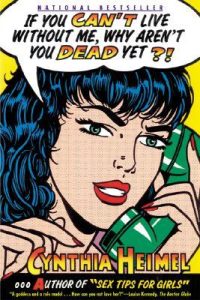
I really wanted to like this book. With a great title like that, I expected it to be a comic look at the relations between men and women, likely coming hard down on the side of women. Instead, it is a mismash of New York angst mixed with the fading regret of yet another runaway from the 60s. In short, choppy doses (each section was originally published as individual essays in Playboy, Cosmopolitan, or The Village Voice), Heimel raves against the world, but not of it ever is funny enough to make you laugh out loud or close enough for that frisson of understanding to occur. Oh, you might be able to identify with her if you are a single mother of a teenage son who supports herself by writing in Manhattan, but I wouldn’t take bets on it.
The essays are grouped into sections labled “The Times,” “Women,” “Men,” “Women and Men,” and “The Writer’s Life.” The best stuff is in “The Times” such as “Notes on Black” about how all the trendy people who were the originators of the black look are conspiring to forgo it for another color until all the sheep quit wearing it, then they’ll go back. The worst stuff is in “The Writer’s Life,” which should instead have been entitled “Cynthia Heimel’s Life” because I saw nothing there that resembled any other writer I know.
I guess I looked in the wrong place. I had noticed that I had a lot of comic stuff by men on my shelf, but nothing by a woman, so I browsed the shelves and came up with this. I’m not necessarily a fan of the comic essay (Dave Barry probably being the prime example of it today, and whom I can read but I never feel like purchasing a whole volume of his stuff). In essays, I tend to like humorous political commentary (say Molly Ivins or P.J. O’Rourke) better than Andy Rooney style essays on the little things of life. Instead I should have picked up comic fiction by a woman, I guess–except I’m not aware of any. Zora Neale Huston? Anyway, with due apologies to Heimel, I can live without her.
[Finished 18 April 1998]
